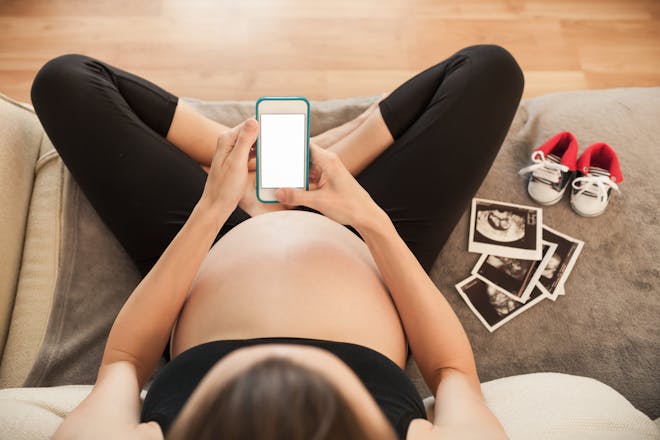Medical experts recommend that all pregnant women sleep on their side during late pregnancy. But why is it necessary, when should you start, and does it matter which side you lie on? We dig into the research to bring you all you need to know about side-sleeping in pregnancy.
This page contains affiliate links, which means we may earn a small amount of money if a reader clicks through and makes a purchase. All our articles and reviews are written independently by the Netmums editorial team.
Why do I need to sleep on my side in late pregnancy?
Research has shown that sleeping on your side is the safest thing for your baby.
When you lie on your back in late pregnancy, the weight of your baby puts pressure on a major blood vessel (the inferior vena cava). This can reduce blood flow to your baby through the placenta.
As a result, sadly, research has shown that women who sleep on their backs in late pregnancy have a higher risk of stillbirth. Although the risk of stillbirth is low for all women (about one in 200), sleeping on your side will reduce the risk even further.
FREE NEWBORN NAPPIES
Lying on your back may also be increasingly uncomfortable as your pregnancy progresses. The pressure on the blood vessel may decrease your blood pressure , which can make you feel faint.
That's why medical experts recommend you go to sleep on your side in late pregnancy. It's important to do this whether you're down for the night, or just having a daytime nap.
You may hear medical professionals talking about the 'supine position' – this means lying on your back. Lying on your front (which simply isn't possible in late pregnancy!) is known as the 'prone position'. Some medical professionals might refer to side-lying positions as 'right lateral' (lying on your right-hand side) or 'left lateral' (lying on your left-hand side).
Sleeping on your side is so important for reducing the risk of stillbirth that the pregnancy charity Tommy's has a whole campaign urging women to sleep on their sides during pregnancy. It may be uncomfortable at first, but it's an important way to protect your baby.
When do I need to start sleeping on my side?
You need to start sleeping on your side once you hit the third trimester (after 28 weeks of pregnancy).
This is because research shows that the risks of sleeping on your back are highest after 28 weeks.
You may prefer to get into the habit earlier in your pregnancy. Pregnancy symptoms such as heartburn are least likely to affect you during the second trimester (from 13 to 27 weeks), so you may find it easier to change your sleeping position during this time.
Does it matter if I sleep on my left or right side?
Which side you sleep on is completely up to you.
There's a small amount of research to suggest that it might be better to sleep on your left side, if that's comfy for you. When you're on your left, your baby's weight isn't pressing on your kidneys, making it easier for your body to get rid of waste.
One small study suggested that sleeping on the left may lead to a slightly lower stillbirth risk than sleeping on your right. However, other studies haven't found the same results.
So if you want to be on the ultra-safe side, it's worth going for the left side. But sleeping on either side is better than sleeping on your back.
What if I roll onto my back in my sleep?
This is unlikely to be a problem. The researchers who have looked into side-sleeping and stillbirth paid most attention to what position women went to sleep in.
So in many of those studies that show sleeping on your side to be safer, it's going to sleep on your side that makes a difference. Research also suggests that the position you go to sleep in is where you'll spend most of the night.
Rest assured that going to sleep on your side will reduce the risk of stillbirth, even if you roll over in the night.
If you wake up in the night and find yourself on your back, just roll over onto your side again before going back to sleep.
If you do roll over in the night, you might even roll back onto your side without waking up; lying on your back can be uncomfortable in late pregnancy, so your body may decide it prefers side-sleeping anyway!
You could also prop yourself up by putting pillows behind your back. This won't guarantee that you'll stay in the same position, but it can help, and you may find it more comfortable, too!
How to get comfy when sleeping on your side
It's not always easy to get to sleep at all – especially when your bump's the size of a beachball. Here are some tips for getting comfy when it's sleep time:
- Use plenty of pillows to help you find a comfy position. You could use them behind your back to stop yourself rolling over, and also pop one between your legs to align your body and reduce any pelvic pain .
- If heartburn is keeping you awake at night, try propping the head end of your bed up a bit, so you can elevate your head whilst still sleeping on your side. A couple of sturdy hardback books under the legs of the bed should do the trick.
- If you have long hair, you could try tying it in a bun at the back of your head; that may make it more comfortable to sleep on your side than your back.
- Try to avoid drinking too much in the evenings. Pregnancy hormones can make you need the loo more often, and the last thing you want is to finally find a comfy position then have to abandon it for the bathroom!
Did you know you can even buy special pregnancy pillows to help you get comfy? Read our guide to getting the best pregnancy pillows here.
Is it safe to sleep on my front in early pregnancy?
Yes, sleeping on your front won't do your baby any harm. They're safety protected by the strong, muscular walls of your womb, and the amniotic fluid that surrounds them.
However, as your pregnancy progresses, sleeping on your front is likely to become increasingly uncomfortable, and eventually it'll be pretty impossible!
If you do somehow wake up on your front in late pregnancy, don't worry; just roll over onto your side again before going back to sleep.
Can I lie on my back when I'm awake?
It's best to avoid it. Whether you're awake or asleep, lying on your back can still reduce the flow of blood to your baby.
That's one reason that women aren't encouraged to lie flat on their back during labour. Active labour positions (such as kneeling or on all fours) can also help you to have a quicker labour.
When you're exercising in pregnancy, it's best to opt for exercises where you don't have to lie flat on your back. If you do want to lie on your back, do so for as short a time as possible, and be sure to move to a different position if you feel faint.
The Positive Birth Book: A New Approach to Pregnancy, Birth and the Early Weeks Paperback by Milli Hill is a must-read for expectant parents. See more details here at Amazon.
Looking for more ways to get a good night's sleep? Check out our articles below or swap tips with other mums-to-be in our forum:







